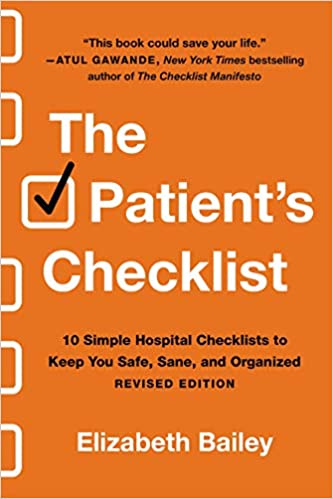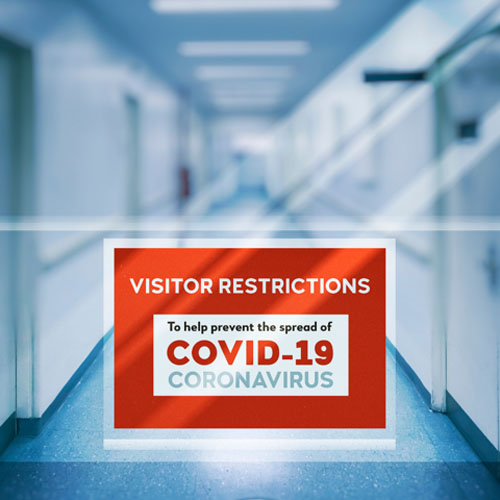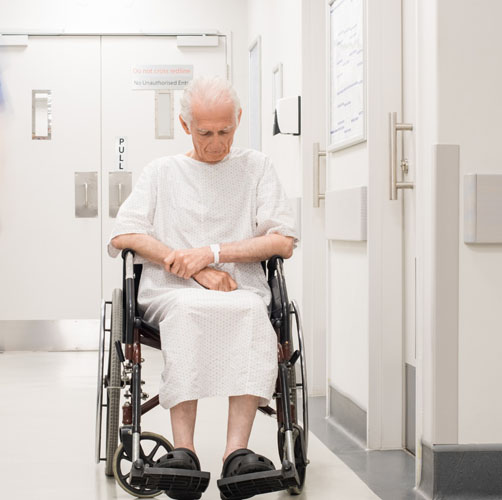
When someone hears from their doctor that they need surgery, the most immediate concerns are likely about their health or the operation itself. But if you live alone, something else should be added to the top of your list — planning ahead for care at home as you recover from surgery.
The number of people in the United States in single-person households increased by four million between 2010 and 2021 from 33 million to 37 million, with 27% of Americans over 60 living alone.
While the number of single-person households continues to grow, what insurance will cover for home-based care after discharge continues to shrink, significantly impacting anyone who lives alone.
The insurance squeeze means that all patients are discharged as quickly as possible – one is sent home from the hospital sooner and sicker. What this means in practical terms for any patient is that the bulk of recovery caregiving, including medical tasks like wound care or maintenance of medical devices like drains or ports, falls squarely on the shoulders of family, friends, and the patient.
Too often, patients and their families think that insurance will cover help at home, either from nurses or home health aides. Insurance pays for very little, if any, skilled nursing services or home health aides once you are discharged home. At most, you may be approved to have a visiting nurse come and check up on you for a brief visit once or twice the first week home. If insurance approves a home health aide, it is generally for no more than a few hours a week for the first two weeks.
The transition from hospital to home is crucial in the recovery process. When you live alone, it is vitally important to plan for what you might need before your surgery once you are back at home.
I recently helped a friend of mine, whom we will call Mary, who lives alone, plan for abdominal surgery for early-stage pancreatic cancer. By the standards of this disease, it was a relatively straightforward operation: a small tumor was removed, and the surgeon took out a small part of her pancreas. She spent one week in the hospital recovering and would need a course of chemotherapy post-surgery.
Mary was very thorough in planning for her potential needs for help at home after her discharge. I found her approach instructive and am sharing it here because these tips are valuable for all of us, not just those who live alone since complex caregiving tasks fall on us.
Mary lives in a one-bedroom apartment and, understandably, was overwhelmed about how to cope with post-surgery care. But she decided upon an action plan that made for an easier recovery and more peace of mind.
First and foremost, she decided to ask for help from her friends and family, and sometimes that can be the most challenging first step.
Her first order of business was to ask family and close friends to take turns staying with her or visiting her for her first several days at home. She was worried people might find this a big “ask.” Instead, everyone wanted to help.
It was important for Mary to clarify to her “helpers” that she had no expectations – that she wanted them only to do what would work for them. Consequently, she created a schedule that worked for everyone while making sure there was always someone with her that first week.
Here are some other tips for how she planned for potential post-surgery needs:
Talking to your surgeon is the place to start – but don’t stop there!
It is essential to recognize that post-surgery care and recovery can vary according to the type of surgery. Will you be discharged with drains or IVs still in place? What will wound care entail? What physical limitations, if any, will you have during your first days at home?
Mary found that while her surgeon was helpful in many respects, he underestimated her condition after surgery. A simple example: at discharge, Mary needed a car service to take her home with the help of a friend. She was concerned that an SUV would have required stepping up to get in with the risk of straining her abdominal muscles.
Her surgeon said not to worry and that she would be fine with any car. But Mary had spent several days in the hospital working with the physical therapist to learn how to get in and out of bed safely.
Based on her own experience, she decided to be cautious and got a sedan. Even getting in and out of this lower car left her muscles feeling strained, and she was glad she had followed her instincts in making her arrangements to get home. And please note that it was up to her to make her travel plans; the discharge planner was not involved.
Your surgeon may have helpful information but consult other experts.
These other experts can include further medical professionals in your surgeon’s office that are part of your care team (the nurse, nurse practitioner, or physician assistant). Since one of them tends to be the recovery point person for you after discharge, they have solid experience following up with their post-surgery patients. They can offer valuable tips on planning for potential needs once home.
The most crucial expert advice you get may come from others who have had the same surgery.
Your fellow patients can offer invaluable insights and workarounds to ensuring a better, safer recovery at home because they’ve been there.
Ask to see your discharge planner as soon as possible during your hospital stay.
Don’t wait – home care is complex, and you and your caregivers might need training in medical tasks or must organize special medical equipment like a hospital bed. Your discharge planner, generally a social worker, is tasked with managing your aftercare to ensure a safe discharge to home.
These professionals can also organize any home-based services you may be entitled to, but it’s essential to start early as it invariably involves wrangling with your insurance. But remember, these services are extremely limited in scope. And they will only help organize home care connected to your insurance. Any private pay situation is up to the patient to manage.
Although Mary was told that releasing her to her home without anyone to help her was technically considered a safe discharge, her discharge planner informally advised her that getting daytime and overnight help was good. But this private pay scenario was up to Mary to organize and pay for.
Mary was glad she had family and friends who managed to stay with her. She still reserved a private pay nurse for the first 24-48 hours if she felt she needed this extra skilled nursing care at discharge – but she could cancel it and did.
The social worker confirmed something Mary also heard elsewhere: that surgeons often underestimate the after-effects of surgery. Who knows why this is? Perhaps some surgeons are so focused on the specifics of the operation that they are not thinking beyond. Maybe some haven’t investigated or solicited input from their patients on whom they had performed the surgery. Perhaps their communication skills are not ideal. Maybe they don’t want to scare their patients – but it can lead to gaps in care once home.
Whatever the cause, Mary found it surprising that a social worker in the same hospital where she was treated made this anecdotal observation about surgeons.
Another source of information turned out to be a home health agency – but call them before you go to the hospital! This was the agency Mary used to reserve a private duty nurse if she felt she needed that level of skilled help – which ultimately, she didn’t.
Yes, the prices can be beyond most people’s budget (as much as $30/hour or more in some metropolitan areas for an aide and as much as $200 for a nurse), but an agency can give you helpful information. It is fine to call them to inquire for information, especially if they figure that you may wind up being a paying customer.
Your surgeon’s office can provide you with a referral list so you can do your homework before your hospital stay. And the discharge planner can help you with referrals if, once in the hospital, the reality hits you that you may need more skilled nursing and home care help than you initially thought.
And if you (like most people!) can’t afford to hire a private-duty aide or nurse, this is where turning to friends, family, your neighbors, and your place of worship for help is key to safe home recovery. And why planning is crucial to accommodate the demands of everybody’s busy lives. This brings us back to where we began.
Mary’s network of friends were valuable sources of information and much-needed caregivers. For example, a friend of Mary’s had helped someone who had the same type of surgery as Mary. Mary learned things she didn’t know from the medical staff, mainly what to eat and what not to eat, which is essential with abdominal surgery involving the pancreas. Turning to her peer group provided a wealth of practical information.
And there are reliable disease-oriented organizations that can provide advice or even connect you with other patients who have relevant experience.
One of the most critical factors for Mary’s speedy recovery was the love and support she got from her friends and family.
Mary’s two main takeaways:
- It is crucial to ask … for help from your support network. And to ask questions – of your medical team, family, friends, and fellow patients.
- And secondly, use your network of family and friends and the information you’ve collected to plan – before you have surgery – for what you might need once you are home alone.
Let’s connect on social! I’m on Twitter, Facebook, and LinkedIn, or by email at [email protected]. Purchase your copy of The Patient’s Checklist here!






